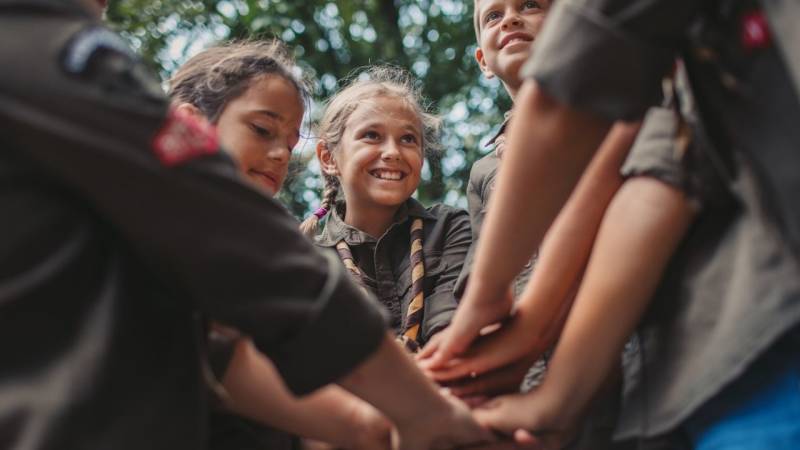
6 important survival lessons I learned as a scout
👉 The key facts from this guide
- When carving, cut away from yourself to avoid injury.
- The darkness begins after noon, so it is important to start setting up the camp early enough.
- Fire should be handled with care and responsibility.
- The campsite should always be kept clean to keep insects and larger animals away.
- If you sweat, it means you are cold because sweat cools the body down.
- It is significant to ensure adequate ventilation in the shelter or tent to avoid condensation and moisture.
Being a scout gave me valuable training in the great outdoors.
And there are many things I learned from it.
Today, I want to share with you my 6 most important survival lessons that I learned from my time as a scout.
Let's dive right in.
1. Carve away from yourself
This tip is especially significant for beginners. A knife is a sharp object that can cause serious injury.
Not only the knife is dangerous, but also a saw, an axe, and a hatchet.
And the most essential measure you need to take: carve away from your body. You must not injure yourself.
I always check this in slow motion mode by pretending to slip. Then I move my hand along the path to see what would happen if I actually slip.
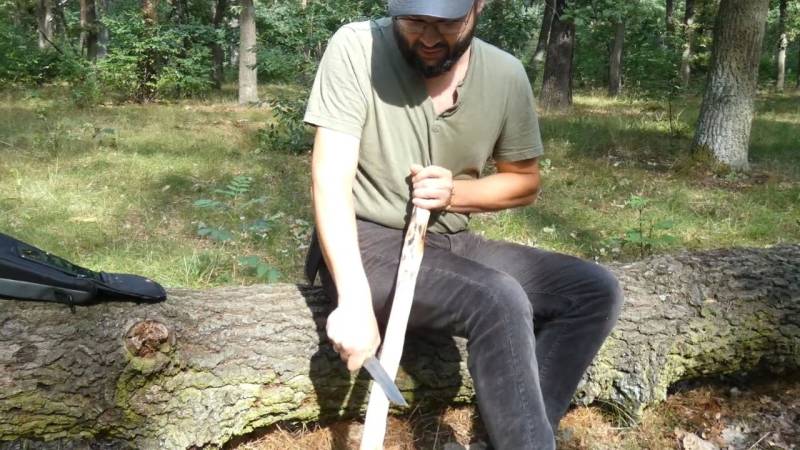
If my hand lands in nothing, everything is okay. If my hand lands on my body, it's the wrong carving position.
When I was a scout, I saw enough young scouts who got injured while chopping firewood, carving, or even playing with their pocket knives.
It sounds trivial, but it's problematic. In a survival situation, an infected or large wound can be the worst mistake of your life.
P.S. There are also carving techniques that lead towards the body - and are safe. You can learn which ones these are and how to perform them in my Knife Basics course in the Wildimpuls program (in German).
2. Darkness begins after noon
People who are inexperienced with nature often underestimate the amount of remaining daylight.
A good rule of thumb is that darkness begins after noon, meaning around 3pm.
If it's mid-afternoon, it's time to find a camping spot.
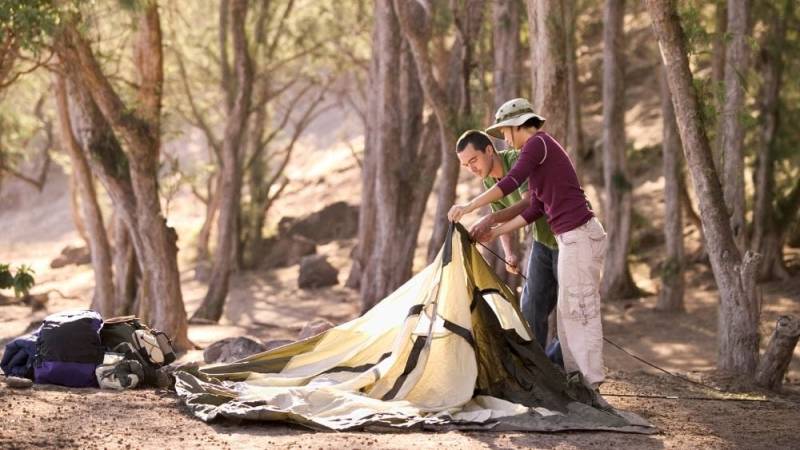
You must set up and furnish your tent, gather firewood, start a fire, and prepare food.
Imagine doing all this in the dark. It's not fun, takes twice as long, and injuries and mistakes happen more easily.
You should do these essential tasks long before the sun sets.
Also read: How to find the ideal location for your bushcraft camp
3. Common sense with fire
Time and time again, I've seen people handle fire irresponsibly.
More wood. Bigger flames. Fireballs with the spray can. And just because they can? It's reckless. Fire is a serious matter.
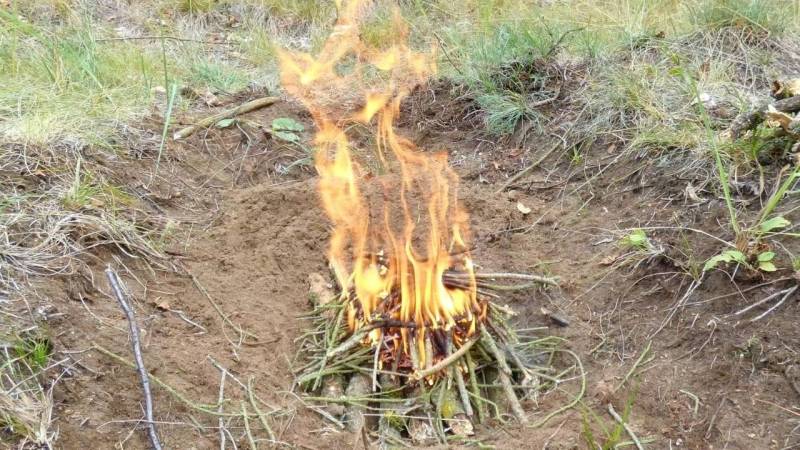
In a survival situation, you must handle your fire carefully and responsibly. It should only be as big as you need it to be. Additionally, gathering firewood takes a lot of energy, which is precious.
Furthermore, it is much easier to build and light a small to medium-sized fire. If you want to boil water, cook something to eat, and stay warm, it is completely sufficient.
I highly recommend my ultimate guide for this: The Bushcraft Fire Pit: How to Build it Perfectly
4. Keep your camp clean
You've finished your dinner, the sun is setting, you're enjoying the spring air. Slowly it gets dark, and then you snuggle up in your sleeping bag.
That sounds great, doesn't it? But what about your camp and the dishes? Should they stay like that overnight? No.
Just get it done and think about the morning after because all these reasons speak against dirty dishes:
- If you leave dishes and food outside overnight, bacteria will gather, and you will attract insects.
- The smell attracts larger animals that you really don't want in your camp.
- It's a pleasure to get up early and make your breakfast in a clean camp.
So remember: Keep your camp clean.
5. Sweating Means Freezing
Even if it's 0 degrees and snowing, you will sweat when you build your snow cave.
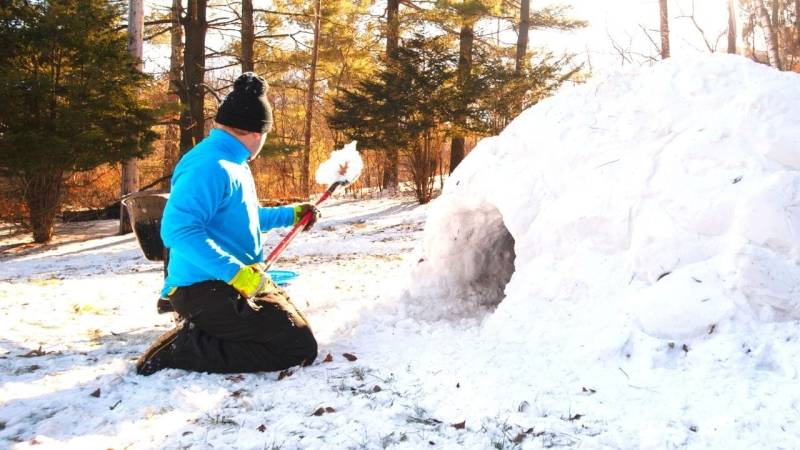
In a cold weather survival situation, your main priority is to retain your body heat, and sweating inevitably leads to a cooling of your body temperature.
When you crawl into your sleeping bag at night, it's best to take off everything you've been wearing. Even if you can't feel it, your clothes are usually sweaty.
During the night, sweat (water) becomes freezing and cools you down as a result. If possible, put on clean, dry clothes right before bed. If you have a decent sleeping bag, you can even sleep naked as long as you are dry and the sleeping bag covers your head and feet.
Reading tip: How to sleep best in a tent? [Sleeping options and tips]
6. Ventilate
In your shelter, especially in your tent, you need to ensure adequate ventilation.
The more airflow you create, the better, regardless of whether the outside temperature is hot or cold.
Everyone who has ever slept in a tent knows that a fresh breeze is a relief in summer. In addition, the tent heats up massively over the course of the day.
In winter, you want to keep it warm and keep the heat inside the tent. But closing all the vents would be fatal.
All night long, your breath and body heat condense and make the inside of your tent wet - and therefore colder.
Waking up damp and wet is not a fun start to the day, and this moisture can be the beginning of hypothermia, which you cannot afford in the great outdoors.
Did you like the tips? What other survival lessons did you learn from the scouts?


Author of the guide
Martin Gebhardt
Hey, I'm Martin. On my blog, you will learn the basics and numerous details about living in the wild. I think survival, bushcraft and the good life in nature are the keys to happiness. Find me here on Instagram or on YouTube. You can find more about my mission on the About Me page.
Was this guide helpful?
28 people found this guide helpful.
4.86 out of 5 points (29 Ratings)
Comments (0)
This post may contain affiliate links. So if you click on the links and make a purchase, I will receive a small commission at no additional cost to you. Click here, to learn more about it.


